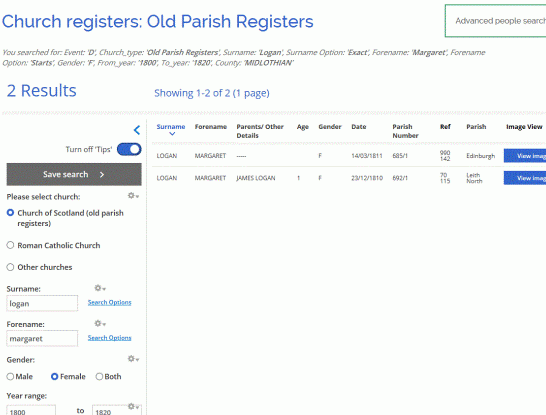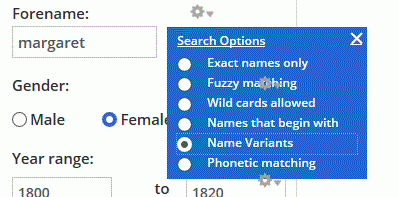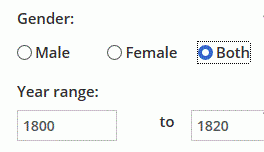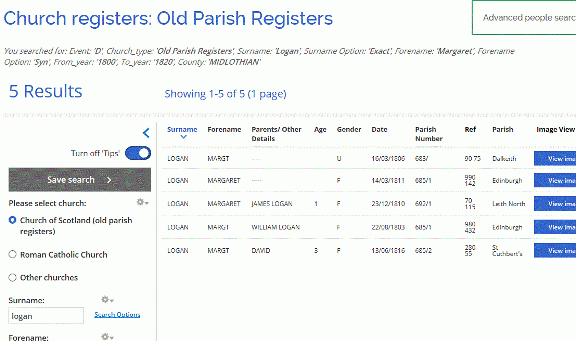Forenames
How to use forename search options
Forenames and naming patterns in Scotland
Forenames and gender - a practical search tip
Background information
This guide is about forenames and how to search effectively by forename in records that are indexed by personal name. It gives you some background on forenames in Scotland, explains why forenames have variations and why the spelling of forenames are sometimes not what you might expect. It gives you advice on how to use forename search options to improve your searching.
Why forename spelling varies
The spelling of the forename might not be as you expect due to:
- transcription error during indexing
- misspelling, phonetic spelling or other misinterpretation by clerks of court
- deliberate or accidental misrepresentation by informants
- forename variations including abbreviation (for example, William, Wm., Willm.), use of diminutives (for example, Margaret, Maggie, Meg, Peggy or Alexander, Alex, Alec, Sandy), nicknames/pet names or middle names as first names.
Middle names
The existence of a middle name can be extremely helpful to the family historian. Parents might use the mother or a grandmother's maiden name as a child's middle name. However, do not assume that this name will appear in all subsequent records pertaining to that child. Consider also the possibility that a person might use a middle name as a first name in later life and be recorded as such. You can try searching with a middle name or without, and try using different search options such as 'names that begin with' and 'wildcards allowed' or even leave the forename field blank. The key thing to consider when searching is to expect inconsistency in the way that people are referred to (or refer to themselves) in different records.
How to use the forename search options

If you are unsure of the spelling of a forename or you suspect the name may have been recorded differently, you can use the forename search options to improve your search. Here are the ways you can use the search options:
Leave the forename field blank
You can leave the forename field blank and search using only the surname or other search fields.
Exact names only
If you select 'Exact names only' it will return all entries that contain the whole search-name, so a search on a forename, will return all entries bearing that name as a first, second or subsequent forename and all entries displaying a second forename or initial, automatically. For example, a search on ANN will return ANN, MARY ANN, ANN ELIZA and ANN J. and so on. Variations in the spelling of a name, though, for example, ANNE or ANNIE, will not be returned.
Note: initials are treated as any other forename: if you search for an initial in the forename field, initials occurring anywhere in the field will be returned. For example, searching for J SMITH will return J SMITH, AGNES J SMITH, AGNES ANNETTA J SMITH and so on.
Fuzzy matching
Fuzzy Matching compares each word in the name searched for with each word in the names in the index using the Levenshtein distance formula. A score of half the number of letters in the word or greater is considered a match. The Levenshtein distance is a metric for measuring the amount of difference between two sequences (the so called edit distance).
Names that begin with
Selecting 'Names that begin' with will perform an implied wildcard search using the initials and/or characters entered in the forename field.
Example, W will be treated as W* and return, for example, W, WILLIAM, WILLM, WM, WILLIAM JAMES, JAMES WILLIAM, JAMES W, as well as all other forenames beginning with W.
Example: ANN J is treated as ANN*J* and will return ANN JANE, ANNE J, ANNIE J, ANNA JACKSON, ANN JANE GIBSON and also CATHERINE ANN J and MARY ANN JANE
Be aware, however, that this facility may return an excessive number of results.
Phonetic matching
Phonetic matching is an attempt to deal with variations in spelling the same word, especially personal names, based on the combination of letters representing sounds. It relies on a phonetic algorithm to suggest possible variations of the same word. On the ScotlandsPeople site we use the Beider-Morse phonetic matching system (sometimes abbreviated as BMPM). For more information on this see the Steve Morse website.
Wildcards allowed
If you select 'Wildcards allowed' it allows you to use symbols to find variations in the characters within a word.
- Substitute * or % for zero or more characters
- Substitute ? or _ for one character only
These characters can be substituted anywhere in the surname or forename and can be employed in various combinations. However, you should try to be as specific as possible in your use of wildcards to avoid returning unnecessary amounts of data.
Be particularly careful in your use of the asterisk wildcard (*) at the end of a forename, because it can return many more results than are useful to you. For example, ANN* will capture ANN, ANNE, ANNIE, but also ANNABEL, ANN-MARIE and so on. It will also return entries exhibiting extra forenames, such as ANN ELIZA and those entries where the chosen forename appears as a second or subsequent forename, for example MARY ANN.
Checking the box below Forename(s) on each search form will initiate an implied wildcard search using the initials and/or characters entered in the forename field.
Example: W will be treated as W* and return, for example, W, WILLIAM, WILLM, WM, WILLIAM JAMES, JAMES WILLIAM, JAMES W, etc. as well as all other forenames beginning with W.
Example: ANN J is treated as ANN*J* and will return ANN JANE, ANNE J, ANNIE J, ANNA JACKSON, ANN JANE GIBSON and also CATHERINE ANN J and MARY ANN JANE.
Be aware, however, that this facility may return an excessive number of results.
Forenames and naming patterns in Scotland
Variations in forenames are very common in the records. The name by which a person was born or christened, might look very different when they married or died. For example, Elizabeth might be known and/or recorded as Elisabeth, Eliza, Betty, Betsy, Beth, Bessie, Elspeth, Elsie, to name but a few. Some of the influences brought to bear on Scottish forenames are indicated below.
Abbreviations, Diminutives, Nicknames/pet names
Records are full of abbreviated forms of some forenames, for example William might be recorded as Will, Wm. or Willm., Charles as Chas., Margaret as Margt. or Mgt., James as Jas., Alexander as Alexr., and so on. Also, diminutives, nicknames and pet names, if habitually in use, might be recorded instead of the proper name, for example Euphan/Eupham/Effy for Euphemia, Katie/Kate/Kath/Kathy for Katherine, Jamie/Jimmy/Jim for James, Maggie/Meg/Peggy for Margaret, Alec/Alex/Sandy/Eck for Alexander, Dod for George. This is particularly prevalent in the Old Parish Register records, and probably more so in smaller parishes, where the person recording the information, usually the session clerk or the minister, would know the families in the area.
Anglicising forenames
It was very common for registrars in Gaelic-speaking areas of the Highlands and Western Isles to anglicise common Gaelic forenames, for instance recording Morag as Mary, Iain as John and Hamish as James. Gaelic-speaking families themselves, who migrated to urban areas, may also have anglicised their names.
Ambiguous names
Names that, today, we would normally associate with boys were occasionally (mainly in the North of Scotland) given to girls and vice versa, for example, Nicholas. Christian, viewed as a boy's name today, was quite a common girl's name in Scotland, and used as an alternative to Christina.
Sometimes during indexing of the Old Parish Registers, it was unclear from the name whether the child was male or female, particularly if the entry recorded child of instead of son of or daughter of. Further confusion would arise if the name had been abbreviated and that abbreviated form could apply equally to a boy or a girl, for example Willm. might be William or Williamina. In such cases, a U for unstated was entered in the index to ensure that the wrong gender was not attributed. These U values are included in searches using the 'both' gender selection.
Many boys’ names were transformed into girls’ names by adding ina, for example Thomasina, Georgina, Hughina, Jamesina, Williamina. These names might be abbreviated to Ina in later life. Williamina might become Mina.
Interchangeable names
Some names are completely interchangeable, for example Agnes and Nancy, Donald and Daniel. Jane could be recorded as Jean, Jessie or Janet.
Early spellings may vary from later ones, for example Jannet, Jhonet, Jonat, Jonnet or Jonet instead of Janet, Margrat or Margret for Margaret, Henrie for Henry, Andro or Androw for Andrew, Alisoun, Alesoune, Alisone for Alison.
Traditional naming patterns
Scots often named children by following a simple set of rules:
- 1st son named after father's father
- 2nd son named after mother's father
- 3rd son named after father
- 1st daughter named after mother's mother
- 2nd daughter named after father's mother
- 3rd daughter named after mother
Although this was not universally applied (some families adhered strictly, others 'dabbled' and still others ignored it), it can still be helpful in determining the correct entry when confronting the relative lack of information in the Old Parish Registers and other records. It can also give rise to great confusion when eight children of the same family in a small parish name their offspring according to convention! The use of traditional naming patterns gradually declined during the 19th century.
The application of naming conventions and the general desire to ensure that a family forename perpetuated through the generations, sometimes led to duplication of forenames within a family. For example, where a family wished to adhere strictly to the traditional naming pattern, and both grandfathers bore the same forename, that name might be given to more than one child. If a child died young, parents might name a later child after the dead sibling. In unfortunate cases, the name may have been used more than once.
Sometimes there appears to be no rhyme or reason to the naming: a child might be named after the minister, the midwife, the doctor, an employer, an influential personage in the community or a close friend, who might appear as a witness to the birth. Witnesses are not always given in Old Parish Register entries, but where they are, sometimes (as in Dundee) you will find their relationship to child, if any, noted, for example 'Charles Jobson, grandfather', 'Mrs Janet Speid, father’s mother'.
Forenames and gender - a practical search tip
Many searches fail because researchers trust too much in the index data matching their expectations. Forename searching, in conjunction with gender, is one area where the data may let you down, but there are a couple of things you can do to improve searching.
Church registers and even some early statutory registers of births, marriages and deaths, are prone to use abbrevations for certain forenames. For church registers in particular this presents a problem to the person who has indexed the records. If the indexer was unsure what the abbreviation meant, he or she might enter the name exactly as it is spelled in the record.
The default search option for the forename field is 'Names that begin with' and this might pick up some abbreviations (such as 'Alex' for 'Alexander') but you could try another search option (such as wildcards or name variants).
The other consideration is, if the indexer has been unsure of the gender and left the gender field as U for unstated, or even got the gender wrong (it sometimes happens), you could widen the search by using the wildcard selection or the name variant option for forename and also selecting 'both' for gender.
In the example below, a researcher is looking in Old Parish Registers for the baptism of Margaret Logan in Midlothian between 1800 and 1820.
The researcher enters LOGAN as the surname and MARGARET as the forename, enters the date range, selects 'female' for gender and selects Midlothian from the county list. The search brings up 2 results, as shown in the image below.

To pick up any variants of 'Margaret', especially abbreviations, and any entries with unstated gender, the researcher filters the search by selecting the 'Name variants' search option for forenames.

Then the researcher changes the gender option to 'both'.

The search now brings up three more results, including the one required (in Dalkeith in 1806).

If, when you view the image, you find that the index entry contains an error (in the way the name is spelled or if the gender is wrong) you can report this to us by using the 'report an issue' button on the image viewer.
